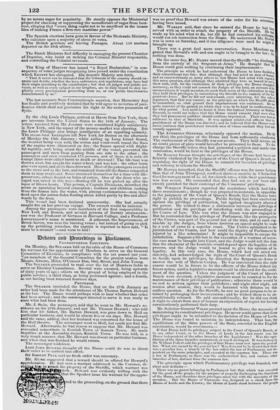By the ship Louis Philippe, arrived at Havre from New
York, there are accounts from the United States to the 18th of January. The letters received from Mr. JAVDON were considered highly satisfactory in New York, and the aspect of the money-market was cheering. But the Louis Philippe also brings intelligence of an appalling calamity. The steam-boat Lexington left New York for Boston on the afternoon of Monday the 13th January : while sailing up Long Island Sound, the weather being very cold, the cotton and wood-work round the flues of the engine were discovered on fire: the flames spread with frightful rapidity, and, being about the middle of the vessel, prevented the passengers and crew front passing from one side to the other : the passengers and crew numbered 175 persons, and of these, it is said, all except three were either burnt to death or drowned The life-boat was thrown over, but caught the water-wheel, and was lost : the other boats also were upset, and all in them drowned. Most of the passengers crowded to the stern and to the bow, and remained there till the flames compelled them to leap overboard. Sonic sustained themselves for a time with lifepreservers, others floated on bales of cotton. One of the three who escaped was saved in this way—floating till he was picked up after the lapse of fifteen hours. This person, a Captain HILLIARD, described the scene as agonizing beyond conception : mothers and children rushing front the flames into the water, with piteous exclamations—men lying dead upon the cotton-bales floating about, killed partly by fire and after-wards by the frost.
This vessel had been declared unseaworthy. She had actually caught fire on her previous voyage. The owners would be indicted.
Among the passengers were merchants of the first respectability in New York and Boston, and several persons of literary attainments : one was the Professor of 'German in Harvard College, and a Professor LONGFELLOW'S name is mentioned. A schooner, the Improvement, of Brook-haven, was near the burning vessel ; but instead of going to pick up the perishing wretches, the captain is reported to have said, "It must be a steamer"—and went to bed!


























 Previous page
Previous page